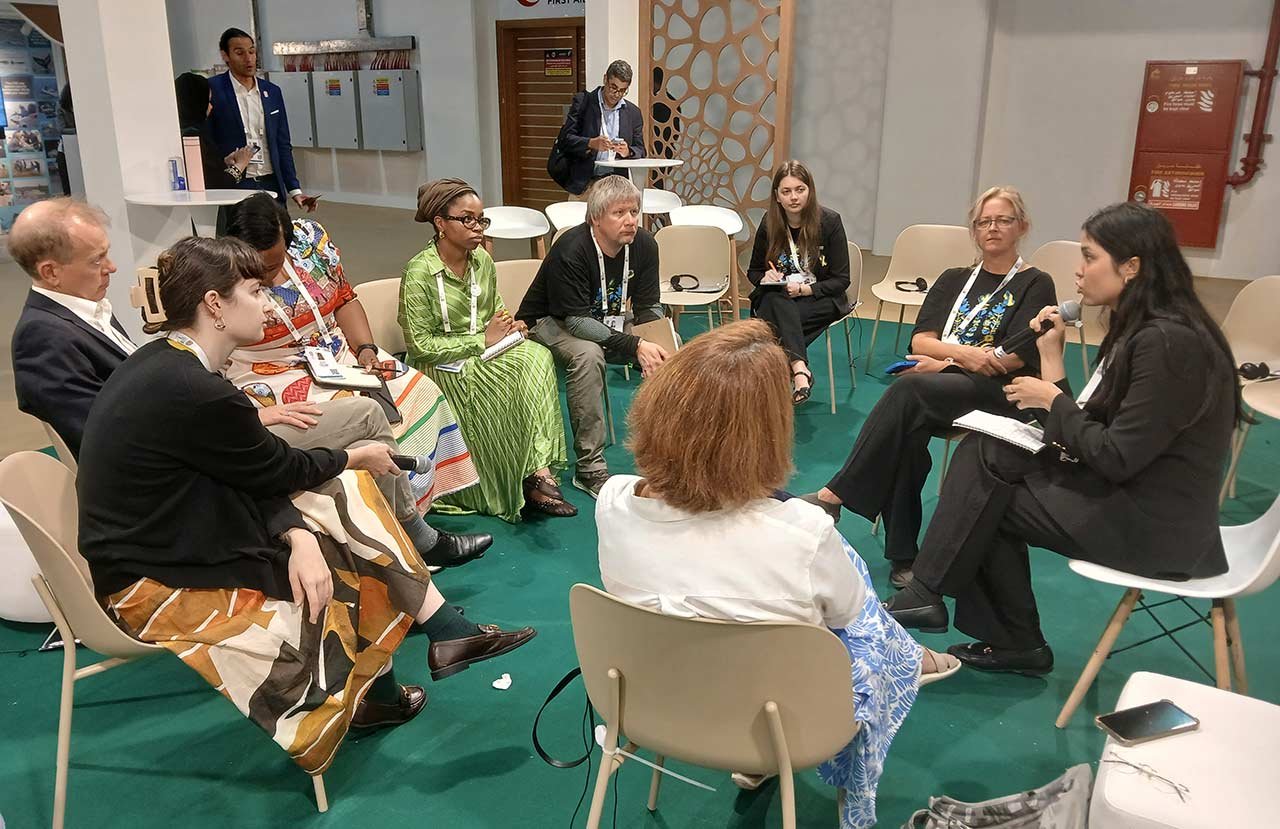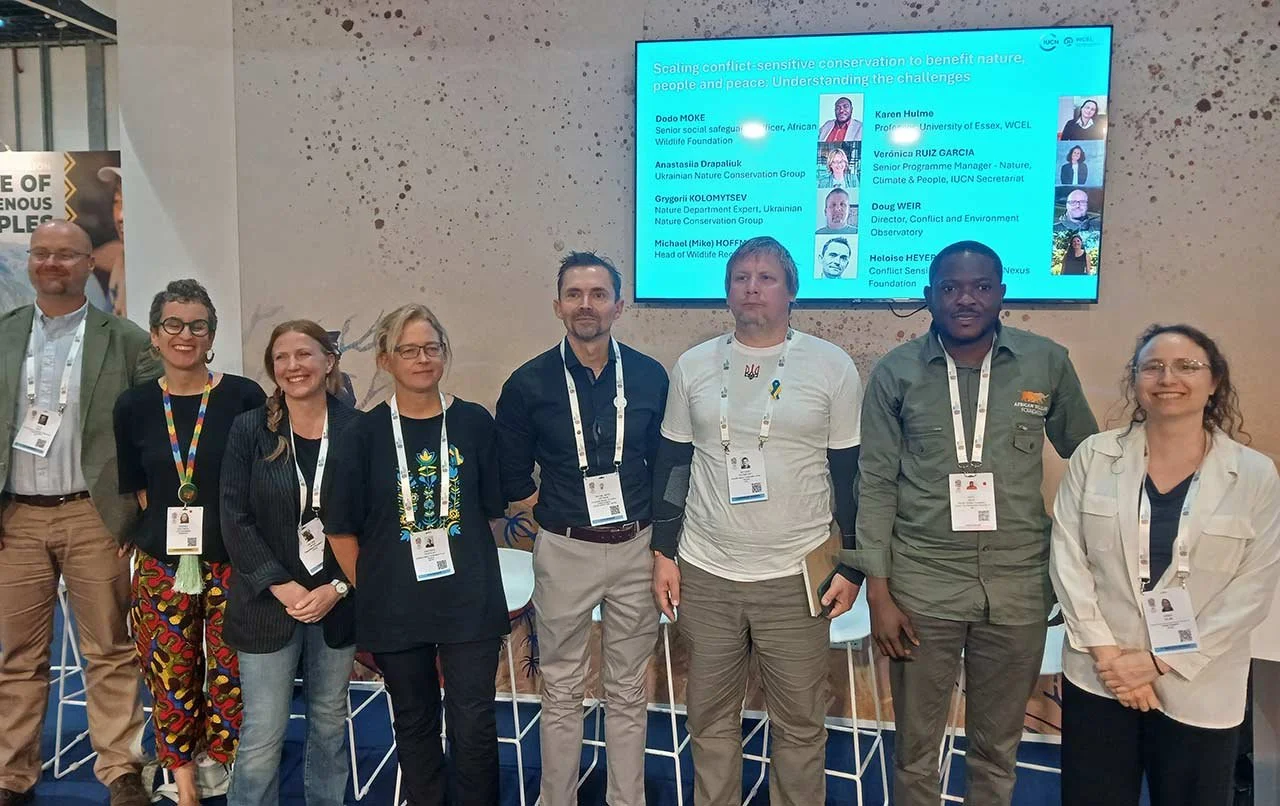IUCN World Conservation Congress 2025: Outcomes for Ukraine
The Congress took place from October 9-15, 2025, in Abu Dhabi, United Arab Emirates, and gathered about 10,000 participants offline. The organizers also provided options for virtual participation via a dedicated remote platform. This is a key global event for conservationists, governments, scientists, civil society, and businesses, where major challenges in species and ecosystem conservation were discussed.
Ukraine, as a state, is not yet a member of the International Union for Conservation of Nature (IUCN) and is represented only by two non-governmental organizations: Ukrainian Nature Conservation Group (which became a member in 2023) and our colleagues, the International Charitable Organization “Environment-People-Law” (a member of IUCN since 2005). During the current Congress, in addition to the two member organizations, representatives from the Charitable Organization “Nature Fund of Ukraine,” the “Tuzly Estuaries National Nature Park” (a significant coastal protected area), and “Frankfurt Zoological Society in Ukraine – FZS Ukraine” were also present.
The issue of the ecological consequences of the Russian aggression in Ukraine was raised for the first time at this largest global gathering on nature conservation.
International Union for Conservation of Nature (IUCN) is the world’s oldest and largest conservation organization, founded in 1948. It comprises over 1,400 members from more than 170 countries, including government agencies, scientific institutions, non-governmental organizations, and indigenous peoples’ representatives. The Union coordinates global efforts in biodiversity conservation, the development of the protected area network, climate change mitigation, and the formulation of international environmental policies. IUCN is the creator of the global Red List of Threatened Species.
Decisions Adopted at the Congress Concerning Ukraine
Motion 065 – Changing the Approach to Aggressor States
Before each World Congress, IUCN members have the right to submit Motions — official proposals that shape the Union’s global policy in nature conservation. Once adopted, they become IUCN Resolutions or Recommendations, which guide and direct the organization’s work for the next four years and beyond.
The Ukrainian Nature Conservation Group, along with partners Environment-People-Law (Ukraine), Caucasus Environmental NGO Network (Georgia), Center for Large Landscape Conservation (USA), Earth Law Center (USA), Center for environmental ethics and law (USA), and with the support of the Nature Fund of Ukraine, utilized this right to initiate Motion 065 “Establishing mechanisms for engagement with IUCN Members involved in armed conflicts,” which was adopted by electronic vote and became an IUCN Resolution.
What does this Resolution entail?
IUCN is now required to develop special terms of participation for aggressor states and organizations registered in those countries, as well as implement other solutions concerning armed conflicts, wars, and nature conservation.
Russian Attempt to Evade Sanctions Prevented
Russian participants in the Congress, even at the “non-state” level, attempted to use the event for political purposes. Specifically, russian representatives intended for the Congress to adopt a resolution amending the IUCN Statute—the organization’s main document—with a wording that would imply that IUCN countries and organizations consider international sanctions against russia to be unfair discrimination. They even sought to cancel membership fees for russian organizations “affected” by the international sanctions imposed against russia. Operational monitoring of russian social media made it clear that they were portraying their very presence at the Congress as recognition and support for russia by the majority of the world’s nations. This political process was financially backed by the state-controlled corporation “Rosatom.”
Despite russia being represented by a rather large delegation led by a representative of the relevant ministry, our small team managed to convince the international community not to vote in favor of adopting such a decision. Our speech at the Assembly and firm stance during the negotiation process sent the pro-russian resolution wording into oblivion. Fragments of the two-day struggle can be viewed in the video.
Video of the debates (Ukrainian and russian speeches only):
Ukrainian Elected to IUCN Leadership Position
Diana Harlytska, a Ukrainian national, was elected as Councilor to the International Union for Conservation of Nature (IUCN) for Eastern Europe, North and Central Asia. This recognition highlights her many years of activity in climate and environmental youth diplomacy, and her work in education aimed at strengthening the region’s role in global environmental protection and sustainable development processes. Diana Harlytska is the founder of the NGO Sustainability Narrative Institute (Vilnius, Lithuania), which works on advocacy and communication in the field of sustainable development. She is also a PhD student researching green finance. Her election to the IUCN Council opens new opportunities for representing the interests of Ukraine and the countries of Eastern Europe, North and Central Asia as a whole at the international level, and will strengthen cooperation in nature conservation.
Announcement video: https://youtu.be/tbTjzQrFflI
Awards
Tuzly Estuaries National Nature Park Team Wins IUCN WCPA International Ranger Award
As part of the preparations for the Congress, the Ukrainian Nature Conservation Group, with the support of the Nature Fund of Ukraine, nominated the team of the Tuzly Estuaries National Nature Park (a crucial coastal protected area) for the IUCN WCPA International Ranger Award. This award is presented annually by the IUCN World Commission on Protected Areas (WCPA) for exceptional dedication to nature conservation. In 2025, the award was received by 13 rangers and teams (6 teams and 7 individual awards) from various countries worldwide—for their courage, resilience, and daily work on the frontline of environmental protection. Among the winners was the team from the Tuzly Estuaries NNP from Ukraine, recognized for their effective protection of Black Sea coastal ecosystems, anti-poaching efforts, and educational activities. The award provides financial support ranging from $5,000 to $25,000 to sustain the laureates’ conservation work and underscores the global significance of the ranger profession in biodiversity conservation. This year, the Tuzly Estuaries NNP team secured second place. We are delighted that the award, among many contenders, was received by the team of the national park nominated by our organization.
Michael Brombacher, Head of Frankfurt Zoological Society (FZS) in Ukraine, Receives the IUCN WCPA Fred Packard Award
The IUCN World Commission on Protected Areas (WCPA) presented the Fred Packard Award—one of the highest international honors in nature conservation—to Michael Brombacher, Director of the Frankfurt Zoological Society (FZS) in Ukraine. This award recognizes long-standing dedication and personal contribution to the development and protection of protected areas worldwide. During the ceremony, Michael Brombacher delivered a speech on the role of Ukrainian national parks during the war. In his address, Brombacher emphasized that the war has given parks a new meaning—they have become spaces of safety, solidarity, and human support. “This award is for all the brave people defending Ukraine’s nature despite the war,” he said, dedicating the honor to Ukrainian conservationists.
Watch award video here.
Events
A number of events at the Congress featured presentations and discussions on Ukraine, some of which were the following:
Session: “The Role of Youth Engagement and Intergenerational Dialogue in Nature Conservation in Conflict and Post-Conflict Contexts”
Within the framework of the IUCN World Conservation Congress 2025, a session titled “The role of youth engagement and intergenerational dialogue in nature conservation in conflict and post-conflict contexts” was held at the Youth Pavilion. The event was organized by the Ukrainian Nature Conservation Group with the support of Conservation Allies (USA). The session aimed to discuss the role of youth in conservation during and after the war, and to find ways for effective intergenerational dialogue among young leaders, scientists, human rights defenders, and protected area managers. The session was conducted in the form of a dialogue and reflection, allowing participants to share their own experiences and perspectives on the importance of intergenerational dialogue and youth leadership, especially in the context of war and post-war recovery. The session was moderated by Anna Kovbasniuk, with Anastasia Drapaliuk and Hryhorii Kolomyitsev facilitating the dialogue.
Session: “Scaling Conflict-Sensitive Conservation for the Benefit of Nature, People, and Peace: Understanding the Challenges”
The session was dedicated to how wars affect nature conservation and how conservation activities can contribute to peacebuilding. Participants discussed legal and policy instruments for environmental protection during armed conflicts, as well as ways to scale up “conflict-sensitive conservation”—an approach that considers the risks of violence, instability, and social tension.
Grygorii Kolomyitsev and Anastasiia Drapaliuk (Ukrainian Nature Conservation Group, Nature Fund of Ukraine) spoke from Ukraine. Grygorii described the scale of destruction to Ukraine’s nature reserve fund as a result of russian aggression, while Anastasiia spoke about the realities of life for Ukrainian conservation institutions during the war and the necessity of excluding russia from international conservation organizations.
The issue of the consequences of russian aggression for nature was also raised in other sessions. For example, during the session “Protecting Nature in Armed Conflicts: Advancing Environmental Justice and Resilience,” speaker Dr. Matrah Almutairi (Kuwait Institute for Scientific Research) emphasized that the russian-Ukrainian war is one of the three most environmentally devastating armed conflicts of the last century. In her presentation, she examined the ecological consequences of wars in the context of international humanitarian law and environmental justice, alongside examples from the Persian Gulf, Vietnam, and Ukraine.
Agreement on Pilot Supply, Installation, and Training for Camera Traps in National Parks and Reserves
Directly during the Congress, the Nature Fund of Ukraine concluded an agreement with the international organization “Conservation Solutions for Wildlife” (USA), according to which a trial batch of camera traps has already been dispatched to Ukraine for biodiversity research in target national parks and reserves. In addition to the equipment, the American partners will also organize training for the state protection service of the nature reserve fund.
Pilot Implementation of the IUCN Green List Standard
The Nature Fund of Ukraine held negotiations regarding the pilot implementation of the IUCN Green List of Protected and Conserved Areas Standard. This is a tool that allows for the assessment of the quality of protected area management according to IUCN standards and provides recommendations for improvements to achieve those standards. Currently, these standards are being implemented in over 600 protected areas across 60 countries.
Next Steps
Ukraine’s State-Level Membership in IUCN. IUCN is a crucial international platform for advancing nature conservation in Ukraine globally, establishing international communications, and initiating cooperation for nature preservation. Many countries are represented in IUCN at the level of ministries, agencies, institutes, individual national parks, etc. Ukraine, however, is represented only by two non-governmental organizations, which significantly limits the ability to promote Ukrainian conservation issues internationally. The necessary step is for Ukraine to join IUCN as a state. We plan to negotiate regarding our country’s accession to the Union.
Participation in the development of engagement mechanisms between IUCN members involved in armed conflicts and wars. In accordance with the Congress’s decision, IUCN must develop such mechanisms. As this process began at our initiative, we plan to take an active part in the development of this document.
Implementation of the IUCN Green List Standard in Ukraine. Mechanisms for assessing the effectiveness of protected area management have not been developed or implemented in Ukraine, which leads to a further decrease in biodiversity, low stakeholder support, and management decisions that do not favor nature. The IUCN Green List Standard can serve as a good basis for developing such mechanisms.
Increasing the presence of the Ukrainian conservation community in IUCN. We call on non-governmental conservation organizations to become IUCN members, and individual scientists and conservationists to be active members of the organization’s commissions. This will provide access to the most current information on innovation in nature conservation, establish contacts with partners, and promote our activities on a global scale.




